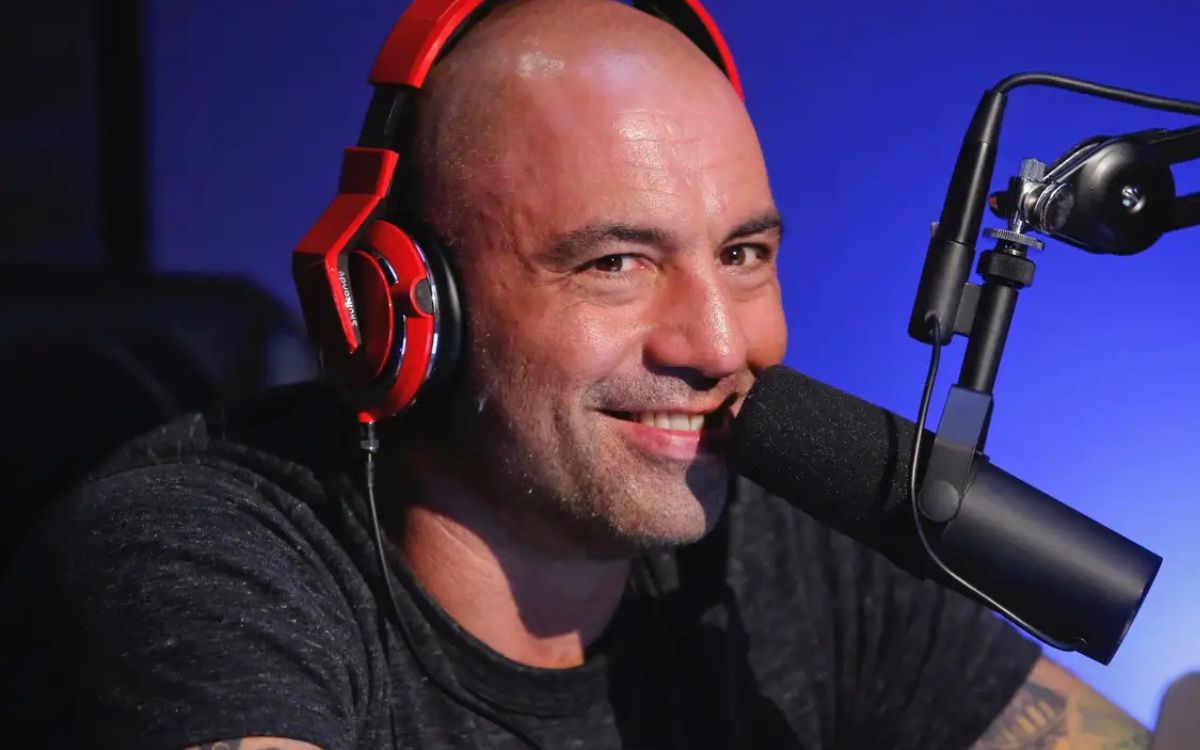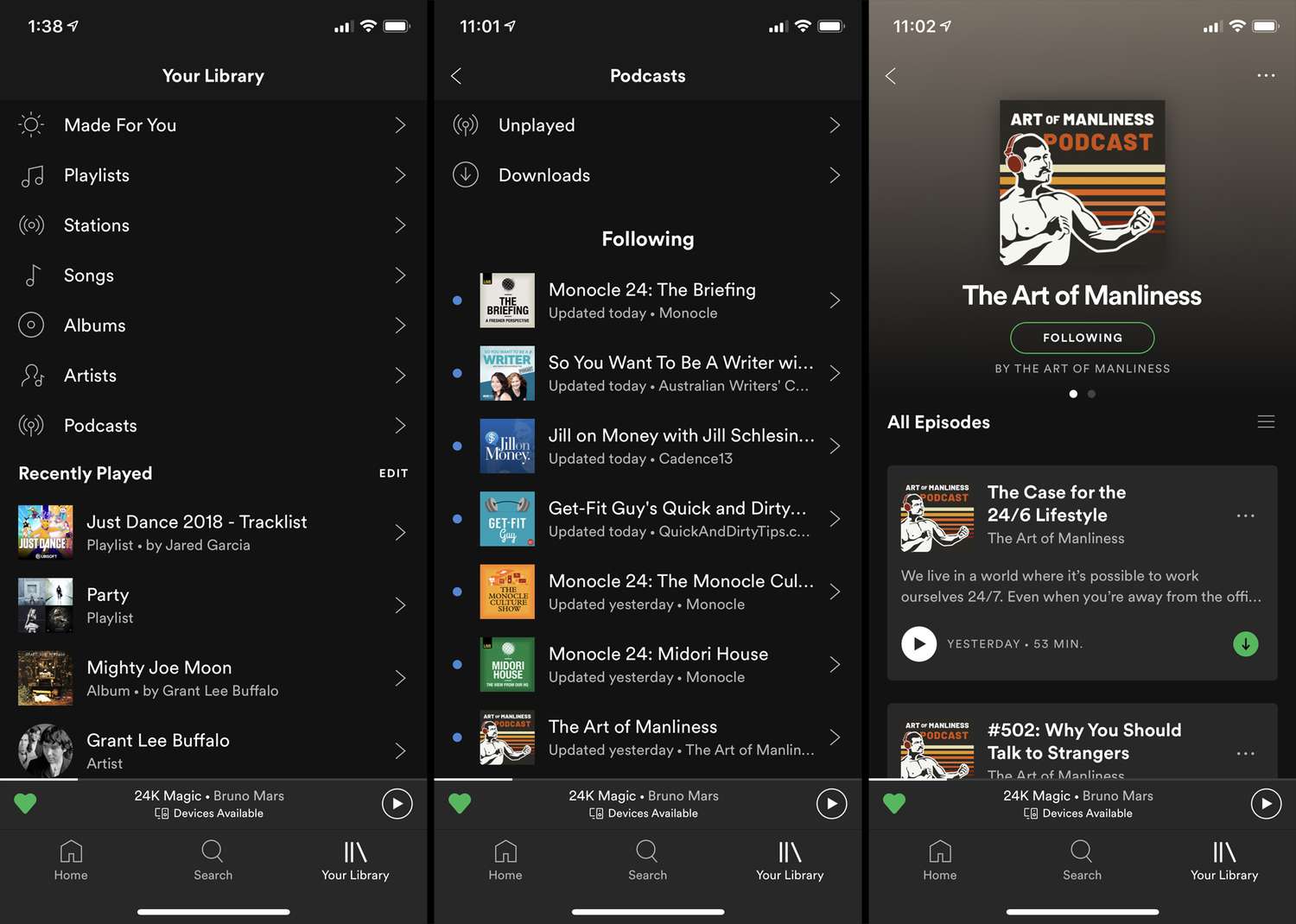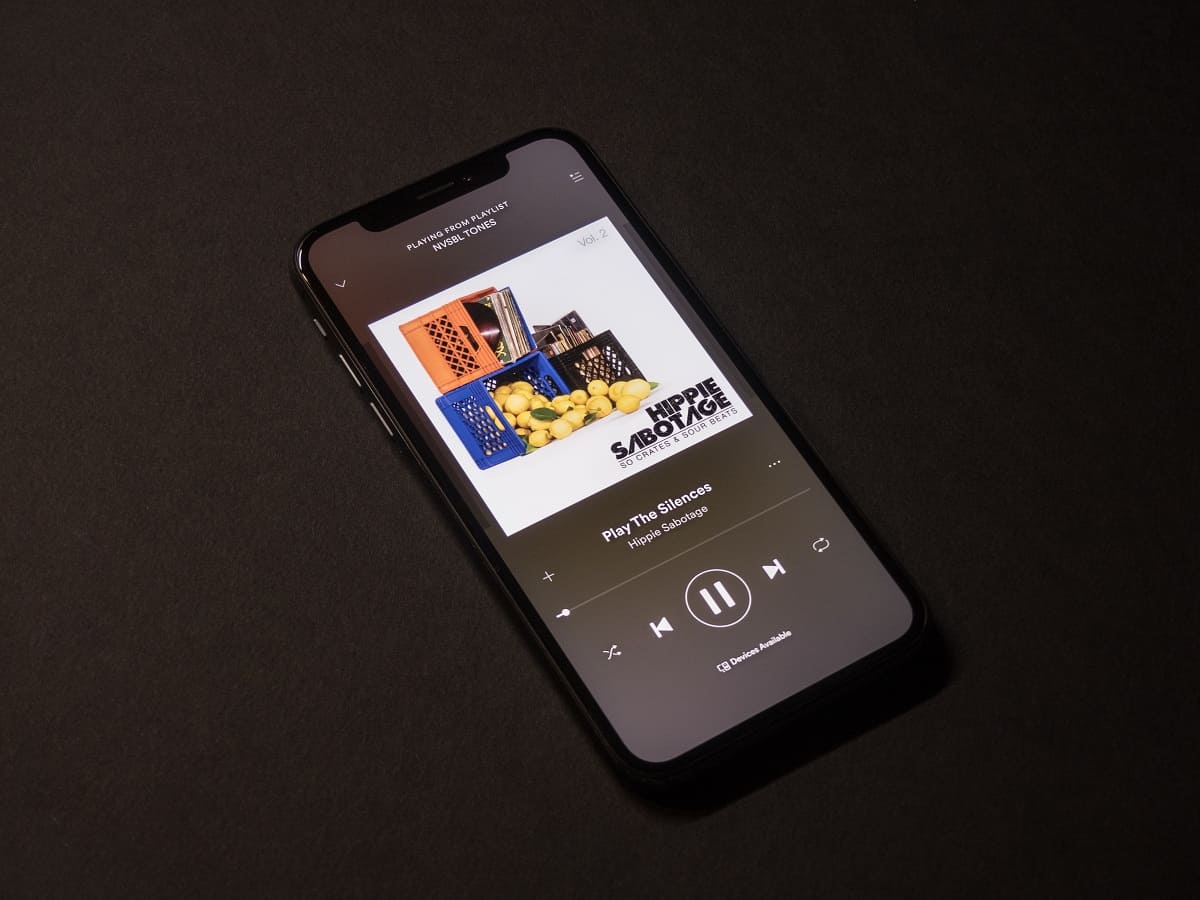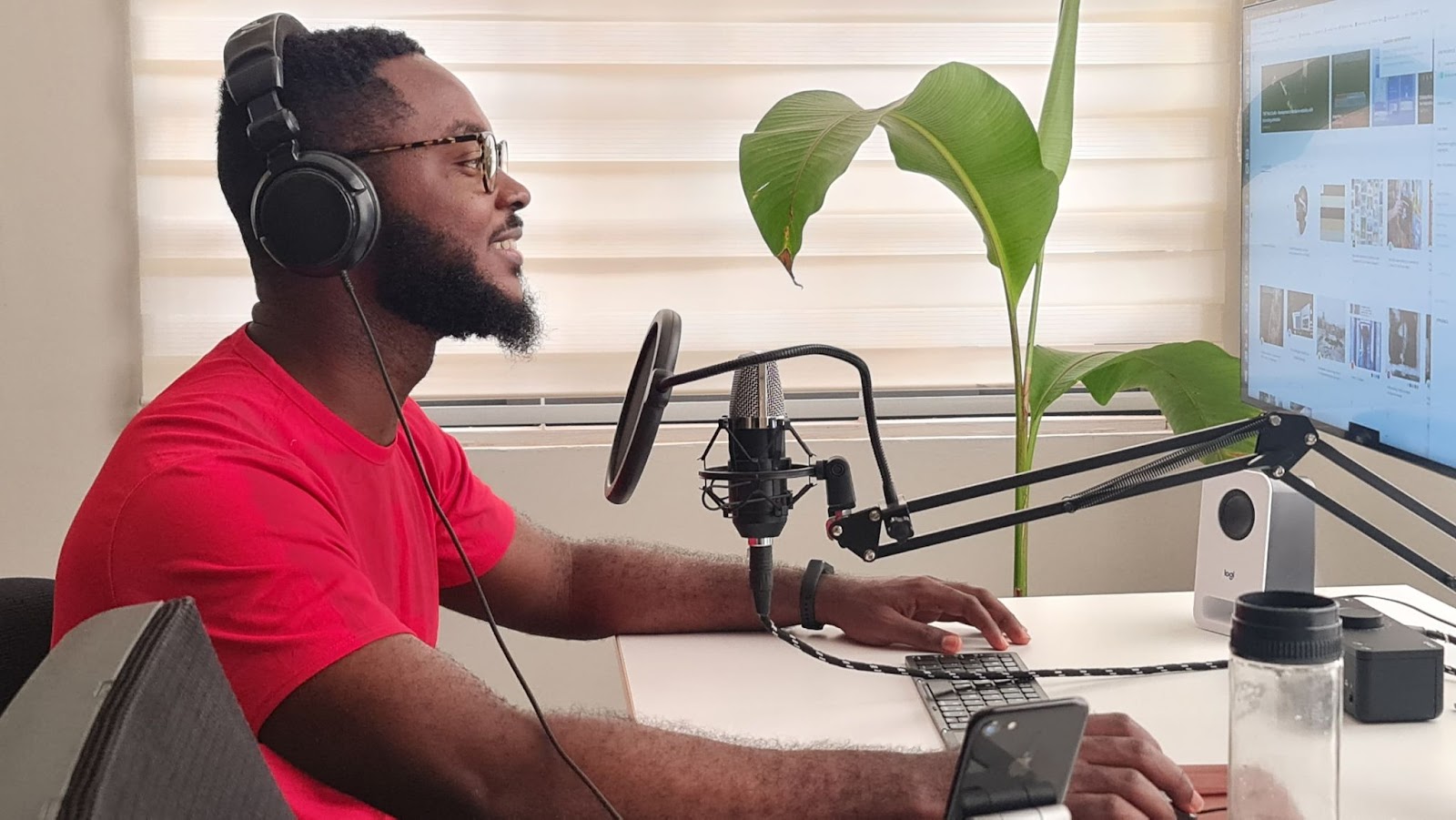Home>Events & Info>Podcast>How To Make Money From A Podcast


Podcast
How To Make Money From A Podcast
Modified: February 17, 2024
Learn how to monetize your podcast and make money from your passion. Discover proven strategies to generate income through podcasting.
(Many of the links in this article redirect to a specific reviewed product. Your purchase of these products through affiliate links helps to generate commission for AudioLover.com, at no extra cost. Learn more)
Table of Contents
- Introduction
- Choosing the Right Podcast Topic
- Setting Up Your Podcast
- Recording Equipment and Software
- Creating Engaging and Valuable Content
- Building an Audience
- Marketing and Promotion
- Monetization Strategies
- Sponsorships and Advertising
- Crowdfunding and Donations
- Selling Merchandise and Products
- Affiliate Marketing
- Offering Premium Content or Memberships
- Conclusion
Introduction
In recent years, podcasts have become a popular and lucrative medium for content creators. With millions of people tuning in to podcasts on a regular basis, it’s no wonder that many individuals are looking to jump on the podcasting bandwagon and explore the potential for making money from their shows.
But how exactly can one monetize a podcast? What steps should you take to ensure that your podcast not only attracts a dedicated audience but also generates revenue? In this article, we will explore various strategies and techniques to help you make money from your podcast.
Before we dive into the different monetization strategies, it’s important to note that building a successful podcast takes time, effort, and dedication. It’s not an overnight success story, but with a well-executed plan and consistent delivery of quality content, you can turn your podcast into a profitable venture.
From choosing the right podcast topic to building an audience and implementing monetization strategies, there are several key factors to consider along the way. Let’s explore each step of the process and discover how you can make money from your podcast.
Choosing the Right Podcast Topic
When it comes to starting a podcast, one of the most important decisions you’ll need to make is selecting the right topic. The topic of your podcast will determine the target audience and the level of interest and engagement it generates. Here are a few factors to consider when choosing your podcast topic:
- Passion and Expertise: Choose a topic that you are passionate about and have extensive knowledge or expertise in. This will not only make hosting the podcast more enjoyable for you but also ensure that you can provide valuable insights and engage your audience effectively.
- Niche or Broad Appeal: Consider whether you want to focus on a specific niche or cater to a broader audience. Niches often have dedicated followers, while broader topics have the potential for a larger reach. Evaluate your interests and target demographic to make an informed decision.
- Market Demand: Research the market demand for your chosen topic. Look for existing podcasts in your niche and assess their popularity. However, don’t be discouraged if there are existing podcasts on your chosen topic. With a unique perspective or approach, you can still carve out your own space and attract an audience.
- Longevity and Consistency: Consider the sustainability of your chosen topic. Will it allow you to create a podcast with a long-term vision? Choose a topic that provides a wealth of content ideas and allows for regular episodes to keep your audience engaged over time.
Once you’ve narrowed down your topic, it’s crucial to conduct keyword research. Determine the keywords and phrases associated with your topic that have a high search volume and low competition. This will help improve the discoverability of your podcast in search engines and increase its visibility among potential listeners.
Additionally, consider the potential for collaboration and guest appearances within your chosen topic. An active and engaged community within your niche can lead to valuable partnerships and cross-promotion opportunities, ultimately helping to grow your audience and monetization potential.
Remember, choosing the right podcast topic sets the foundation for success. Take the time to thoroughly research, evaluate your interests and expertise, and consider the market demand to ensure that your chosen topic will resonate with your intended audience.
Setting Up Your Podcast
Once you have a clear idea of your podcast topic, it’s time to set up the infrastructure to bring your show to life. Here are the essential steps to follow when setting up your podcast:
- Choose a Podcast Hosting Platform: Selecting the right podcast hosting platform is crucial for hosting and distributing your episodes. Look for a platform that offers reliable hosting, easy episode management, and distribution to various podcast directories, such as Apple Podcasts, Spotify, and Google Podcasts.
- Create a Podcast Logo and Cover Art: Design a compelling logo and eye-catching cover art that reflects the essence of your podcast. These visual elements will help your show stand out among others and attract potential listeners.
- Compose an Engaging Podcast Description: Craft a captivating and concise podcast description that clearly conveys what your show is about and entices listeners to tune in. Make sure to include relevant keywords to improve discoverability.
- Set Up a Professional Podcast Website: While not mandatory, having a dedicated podcast website can provide additional branding opportunities and serve as a hub for your episodes, show notes, and other resources. Include an “About” page, contact information, and links to your social media profiles to further engage with your audience.
- Invest in Quality Recording Equipment and Software: To deliver professional-quality audio, invest in a reliable microphone, headphones, and recording software. Opt for a quiet and acoustically treated recording space to minimize background noise and distractions.
- Create an Episode Format and Structure: Determine the format, structure, and length of your episodes. Decide if you want to have a solo show, interviews, or co-hosted discussions. Consistency in episode length and structure will help establish expectations for your audience.
- Plan and Prepare Episode Content: Create a content plan for your episodes in advance. Outline topics, key points, and potential guest interviews. This preparation ensures seamless episode delivery and helps maintain a consistent publishing schedule.
- Practice and Refine Your Presentation Skills: Take the time to practice your delivery, speaking style, and overall presentation skills. Developing a confident and engaging podcasting voice will help captivate your audience and keep them coming back for more.
By following these steps, you’ll have a solid foundation for your podcast. Take the time to set up your podcast with care and attention to detail, as a well-planned and professional setup will enhance the overall listening experience, attract more listeners, and lay the groundwork for successful monetization strategies.
Recording Equipment and Software
Recording high-quality audio is essential for creating a professional-sounding podcast. To achieve this, you will need to invest in the right recording equipment and software. Here are some key considerations when choosing your recording setup:
- Microphone: A good quality microphone is the cornerstone of your recording setup. Look for a microphone that is specifically designed for podcasting, such as a dynamic microphone, which is great for reducing background noise. USB microphones offer convenience and ease of use, while XLR microphones provide higher audio quality but require an audio interface.
- Headphones: A pair of closed-back headphones is essential for monitoring your audio while recording and editing. They help you catch any issues with sound quality or background noise during the recording process.
- Pop Filter and Windscreen: To reduce plosive sounds (the harsh “P” and “B” sounds) that can be captured by the microphone, use a pop filter. A windscreen is also useful for minimizing breath sounds and wind noise if you record outdoors or in a less controlled environment.
- Audio Interface: If you opt for an XLR microphone, you will need an audio interface to connect it to your computer. An audio interface acts as a bridge between the microphone and your computer, ensuring high-quality audio signal transfer.
- Recording and Editing Software: There are many software options available for recording and editing your podcast episodes. Audacity, GarageBand (for Mac users), Adobe Audition, and Reaper are popular choices. These software programs allow you to edit and enhance your audio, remove background noise, and add music or sound effects.
- Acoustic Treatment: Consider the acoustic environment in which you record. Minimize echo and reverberation by adding simple acoustic treatment, such as foam panels or blankets, to absorb reflections and improve sound quality.
- Backup and Storage: Don’t forget to have a backup plan for your recordings. External hard drives or cloud storage solutions can provide an additional layer of protection for storing your podcast files.
Keep in mind that a professional-sounding podcast requires a balance between quality equipment and proper technique. Experiment with different microphone positions, adjust your recording levels, and consistently monitor your audio quality to optimize the sound output.
Remember, while it’s important to have good quality equipment, it’s not necessary to break the bank when starting out. Many podcasters have achieved great success using affordable setups. Focus on finding the right combination of equipment that suits your budget and delivers the audio quality you desire.
By investing in the right recording equipment and software, coupled with attention to proper recording techniques, you’ll be well on your way to producing high-quality audio for your podcast.
Creating Engaging and Valuable Content
Creating engaging and valuable content is crucial for attracting and retaining listeners to your podcast. The success of your podcast hinges on delivering episodes that captivate your audience and keep them coming back for more. Here are some tips to help you create compelling content:
- Define Your Unique Voice: Identify what sets your podcast apart from others. Determine your unique perspective, style, and tone of voice that will resonate with your target audience.
- Plan Your Episodes: Take the time to plan your episodes in advance. Create an episode outline or script to ensure a clear structure and flow of content. This will help you stay organized and deliver episodes with a cohesive message.
- Provide Value to Your Audience: Focus on providing valuable and informative content that solves problems or addresses the needs and interests of your audience. Offer insights, tips, and actionable advice that they can apply in their own lives.
- Be Authentic and Genuine: Authenticity is key to building a loyal audience. Be yourself, share personal anecdotes, and let your true personality shine through. Your listeners will appreciate the genuine connection and authenticity.
- Showcase Unique Stories and Perspectives: Bring on guests with unique stories and perspectives that align with your podcast’s theme. This adds variety and depth to your content and exposes your audience to different ideas and experiences.
- Engage with Your Audience: Encourage audience engagement by inviting them to share their thoughts, questions, and feedback. Respond to comments on your social media platforms or dedicated podcast website. Consider including listener questions or featuring listener stories in your episodes.
- Mix Up Your Episode Formats: To keep your podcast fresh and engaging, experiment with different episode formats. Consider solo episodes, interviews, panel discussions, or even mini-series within your main podcast. Variety helps to cater to different preferences and keeps your audience excited for each new episode.
- Use Storytelling Techniques: Storytelling is a powerful tool for captivating your audience. Craft compelling narratives, share personal experiences, and use storytelling techniques to create an emotional connection and keep your listeners engaged.
- Deliver Consistent Episodes: Consistency is key in podcasting. Establish a regular publishing schedule and stick to it. This builds anticipation and trust with your audience, knowing they can rely on you for new episodes at a consistent frequency.
Remember, creating engaging and valuable content is an ongoing process. Continuously seek feedback from your audience, monitor listener metrics, and adapt your content strategy accordingly. By focusing on delivering quality content and nurturing the relationship with your audience, you’ll foster a loyal listener base and lay the foundation for successful monetization strategies.
Building an Audience
Building an audience is a crucial step in the success of your podcast. Without a dedicated and engaged audience, it can be challenging to monetize your podcast. Here are some effective strategies to help you build an audience for your podcast:
- Define Your Target Audience: Clearly identify your target audience and understand their interests, preferences, and needs. This will help you tailor your content to attract the right listeners.
- Create Compelling Podcast Artwork and Descriptions: Design eye-catching podcast artwork that grabs people’s attention and reflects the tone and content of your show. Craft a compelling description that effectively communicates what your podcast is about and why people should listen.
- Promote on Social Media: Leverage social media platforms to promote your podcast. Create dedicated accounts for your podcast on platforms such as Facebook, Instagram, Twitter, and LinkedIn. Share snippets of your episodes, behind-the-scenes content, and engage with your audience through comments and messages.
- Guest Appearances on Other Podcasts: Collaborate with other podcasters by appearing as a guest on their shows. This exposes you to a new audience that may be interested in your content and encourages cross-promotion.
- Optimize for Search Engines: Utilize search engine optimization (SEO) techniques to improve the discoverability of your podcast. Use relevant keywords in your podcast title, episode titles, and descriptions. Consider creating a transcript for each episode to boost SEO and accessibility.
- Encourage Listeners to Leave Reviews and Ratings: Reviews and ratings play a significant role in attracting new listeners. Encourage your audience to leave honest reviews and ratings on platforms such as Apple Podcasts or Podchaser. Positive reviews can pique the interest of potential listeners and increase your podcast’s credibility.
- Engage with Your Audience: Actively engage with your audience and build a community around your podcast. Respond to comments, questions, and messages promptly. Consider creating a dedicated email address or setting up a voicemail line for listeners to reach out to you directly.
- Collaborate with Influencers or Industry Experts: Seek out influencers or industry experts who align with your podcast’s theme and collaborate with them on special episodes or projects. Their existing following can introduce new listeners to your podcast.
- Attend Podcasting Events and Conferences: Networking at podcasting events and conferences is a great way to connect with other podcasters and potential listeners. Engage in conversations, share your podcast, and learn from industry leaders to expand your reach.
- Offer Incentives for Subscriptions or Sign-ups: Encourage listeners to subscribe to your podcast or sign up for your newsletter by offering exclusive content, early access to episodes, or special discounts. This creates a sense of exclusivity and rewards loyal listeners.
Building an audience takes time and effort, but with consistency and dedication, you can steadily grow your listener base. Continuously analyze your metrics, adapt your strategies, and listen to audience feedback to refine your content and engagement tactics. By building a strong and supportive community around your podcast, you lay the groundwork for successful monetization strategies.
Marketing and Promotion
Marketing and promotion are essential aspects of growing your podcast’s reach and gaining visibility among potential listeners. Here are some effective strategies to help you market and promote your podcast:
- Create a Consistent Brand: Develop a unique and memorable brand identity for your podcast. This includes your podcast name, logo, tagline, and overall visual aesthetic. Consistency in branding helps to establish recognition and build trust with your audience.
- Utilize Social Media Platforms: Leverage social media platforms to promote your podcast and engage with your audience. Create engaging content, share episode highlights, behind-the-scenes footage, quotes, and images. Actively participate in relevant communities, groups, and discussions to expand your reach.
- Collaborate with Influencers: Partner with influencers or industry experts who have a similar target audience and collaborate on cross-promotion. This could involve appearing as a guest on their podcast, participating in joint social media campaigns, or sharing each other’s content.
- Create Engaging Teasers and Trailers: Craft compelling teaser episodes or trailers that provide a taste of what listeners can expect from your podcast. Share these teasers on your podcast website, social media platforms, and podcast directories to entice potential listeners.
- Guest Blogging and Podcasting: Offer to write guest blog posts or appear as a guest on other podcasts that share a similar target audience. This helps you tap into a new audience and establish yourself as an expert in your niche.
- Utilize Email Marketing: Build an email list of loyal listeners and engage with them through newsletters or updates. Provide exclusive content, bonus episodes, or early access to upcoming episodes to reward subscribers and keep them engaged.
- Optimize Your Podcast Website for SEO: Optimize your podcast website for search engines by using relevant keywords in your website content, episode titles, descriptions, and metadata. This helps improve your website’s visibility in search engine results and attracts organic traffic.
- Attend Events and Conferences: Participate in podcasting events, industry conferences, or relevant community gatherings. Network with fellow podcasters, industry professionals, and potential listeners to create connections and spread the word about your podcast.
- Encourage Word-of-Mouth Recommendations: Ask your audience to share your podcast with their friends, family, and social networks. Consider running referral programs or offering incentives for listeners who successfully refer new listeners to your podcast.
- Run Paid Advertising Campaigns: If you have the budget, consider running paid advertising campaigns on platforms like social media, search engines, or podcast directories. Target specific demographics or interests to reach potential listeners who may be interested in your content.
Remember, marketing and promotion require consistent effort and experimentation to find what works best for your podcast. Monitor your analytics, track the success of your strategies, and adapt your approach based on audience feedback and data analysis. By effectively marketing and promoting your podcast, you can expand your listener base, increase engagement, and improve your chances of monetization success.
Monetization Strategies
Once you have built a loyal and engaged audience for your podcast, it’s time to explore monetization strategies to generate revenue from your show. Here are some effective ways to monetize your podcast:
- Sponsorships and Advertising: Seek out potential sponsors or advertisers relevant to your podcast’s niche. Collaborate with brands that align with your content and audience. Include sponsored segments or advertisements in your episodes, or offer dedicated sponsorship slots to increase revenue.
- Crowdfunding and Donations: Engage with your audience and offer them the opportunity to support your podcast through crowdfunding platforms like Patreon, Ko-fi, or through direct donations. Provide exclusive content or perks to your supporters.
- Selling Merchandise and Products: Create and sell branded merchandise such as t-shirts, mugs, or stickers featuring your podcast logo or catchphrase. You can also develop and sell digital or physical products related to your podcast’s theme.
- Affiliate Marketing: Promote products or services as an affiliate and earn a commission for any sales generated through your affiliate links. Choose products that align with your podcast’s content and recommend them to your audience in a genuine and authentic way.
- Offering Premium Content or Memberships: Create a subscription-based model where you offer premium or bonus content exclusively to paying members. This could include ad-free episodes, behind-the-scenes access, or additional resources.
- Live Events and Workshops: Organize live events or workshops related to your podcast’s niche. Offer tickets for attendees to experience live recordings, panel discussions, or educational sessions. You can also collaborate with sponsors to cover the costs.
- Consulting or Coaching Services: If you have expertise in your podcast’s topic, offer consulting or coaching services to your audience. This can be done through one-on-one sessions, group coaching programs, or online courses.
- Partnerships and Collaborations: Collaborate with other podcasters or content creators to develop joint projects or initiatives. This could include co-hosting special episodes, creating a podcast network, or organizing interviews or panel discussions together.
- Brand Partnerships: Work with brands on long-term partnerships where you become an ambassador or influencer for their products or services. This can involve sponsored content, affiliate agreements, or promotion of their offerings to your audience.
- Secure Speaking Engagements: Utilize your podcasting expertise to secure speaking engagements at industry conferences, events, or even educational institutions. This not only showcases your authority in your niche but also provides an additional revenue stream.
Remember, there is no one-size-fits-all approach to podcast monetization. Experiment with different strategies, analyze the results, and adapt based on the feedback and preferences of your audience. It’s important to strike a balance between generating income and providing value to your listeners. With a combination of creativity, strategic partnerships, and a deep understanding of your audience, you can successfully monetize your podcast and turn your passion into a profitable endeavor.
Sponsorships and Advertising
Sponsorships and advertising are popular and effective ways to monetize your podcast. By partnering with relevant brands and incorporating sponsored segments or advertisements into your episodes, you can generate revenue while delivering valuable content to your audience. Here’s how you can leverage sponsorships and advertising to monetize your podcast:
1. Identify Potential Sponsors: Seek out potential sponsors that align with your podcast’s niche and target audience. Look for brands that would benefit from reaching your listeners and whose values align with your content. Research companies within your industry or reach out to brands that are frequently advertising on other podcasts in your niche.
2. Develop a Media Kit: Create a professional media kit that showcases your podcast’s statistics, audience demographics, and the value you provide to sponsors. Include information about your download numbers, listener demographics, social media following, and any awards or recognition your podcast has received. A comprehensive media kit can entice potential sponsors by demonstrating the reach and influence of your show.
3. Craft Engaging Sponsored Segments: When integrating sponsorships into your episodes, be authentic and create engaging sponsored segments. Incorporate the sponsor’s message naturally within your content, making sure it aligns with your show’s style and tone. Avoid a purely sales-focused approach and instead focus on providing value to both your audience and the sponsor.
4. Offer Different Advertising Options: Consider offering different advertising options to cater to the needs of your sponsors. This could include pre-roll or mid-roll advertisements, sponsored episodes, product mentions, or host-read endorsements. Providing a variety of options allows sponsors to choose the format that best suits their marketing goals and budget.
5. Monitor Metrics and Provide Reports: Keep track of key metrics related to your sponsored segments, such as download numbers or click-through rates. This data will not only help you assess the success of your sponsorships but also provide valuable insights to share with your sponsors. Regularly provide detailed reports that demonstrate the impact of their sponsorship and the exposure they received through your podcast.
6. Cultivate Long-Term Relationships: Foster long-term relationships with your sponsors by providing excellent service, delivering on your promises, and going above and beyond to exceed their expectations. Repeat sponsorships can lead to more stable and consistent revenue, as sponsors recognize the value of reaching your audience repeatedly over time.
7. Stay Transparent and Comply with Guidelines: Maintain transparency with your audience regarding your sponsorships and advertising. Clearly disclose when you are presenting sponsored content to maintain trust and integrity. Adhere to industry guidelines and regulations, such as the Federal Trade Commission’s guidelines on disclosing sponsored content in podcasts.
8. Seek Out Affiliate Partnerships: In addition to traditional sponsorships, consider forming affiliate partnerships with brands that offer products or services relevant to your podcast’s audience. By promoting these products through your affiliate links and earning a commission on sales, you can create an additional revenue stream.
Remember, it’s essential to strike a balance between monetization and maintaining the integrity of your podcast. Consider your audience’s preferences, select sponsors or advertisers that align with your values, and deliver ads that add value to your listeners. By cultivating meaningful and mutually beneficial sponsorships and advertising relationships, you can effectively monetize your podcast while providing engaging content to your audience.
Crowdfunding and Donations
Crowdfunding and donations provide an opportunity for your dedicated listeners to support your podcast financially. By creating a community-driven funding model, you can generate revenue and continue delivering valuable content to your audience. Here’s how you can leverage crowdfunding and donations to monetize your podcast:
1. Choose a Crowdfunding Platform: There are several crowdfunding platforms available, such as Patreon, Ko-fi, and Buy Me a Coffee. Research and select the platform that aligns best with your podcast and the features you require.
2. Offer Bonus or Exclusive Content: Incentivize your listeners to become patrons or make donations by offering exclusive content or bonus episodes. Provide extra value to those who support your podcast financially, such as behind-the-scenes access, Q&A sessions, or early access to episodes.
3. Set Clear and Attainable Funding Goals: Clearly outline your funding goals and how the funds will be used. Break down your goals into achievable milestones to give your audience a sense of progress and impact. This transparency encourages support and builds trust with your community.
4. Establish Reward Tiers: Create reward tiers that offer different benefits or perks based on the level of financial support. For example, you can offer shout-outs in episodes, personalized thank-you messages, merchandise discounts, or even the opportunity to contribute to episode topics or guest suggestions.
5. Communicate the Financial Impact: Explain to your audience how their financial support directly impacts the production quality and sustainability of your podcast. Help them understand that their contributions go towards covering hosting fees, equipment upgrades, and other costs associated with delivering high-quality content.
6. Engage and Interact with Your Supporters: Foster a sense of community by engaging and interacting with your supporters. Respond to messages, comments, and emails from your patrons, and consider holding exclusive Q&A sessions or live chats for your financial backers. The personal connection strengthens the relationship and encourages ongoing support.
7. Provide Multiple Donation Options: Offer various donation options, such as one-time contributions or recurring monthly pledges, to cater to the preferences of your audience. Some listeners may prefer to make a one-time donation, while others may be willing to commit to ongoing support.
8. Show Gratitude and Recognition: Regularly express your gratitude to your patrons and donors. Give them public recognition on your podcast, website, or social media platforms. Highlight the impact their support has had on your podcast and emphasize the importance of their contribution.
9. Keep Your Supporters Updated: Keep your supporters informed about the progress of your podcast and any milestones or achievements you reach. Share updates about upcoming episodes, events, or special projects exclusive to your patrons. Regular communication shows your appreciation and helps maintain the connection with your donor community.
10. Explore Other Donation Channels: In addition to crowdfunding platforms, consider providing alternative donation channels, such as PayPal or direct donations through your podcast website. Offer flexibility to those who may prefer to contribute outside of the official crowdfunding platform.
Remember, with crowdfunding and donations, transparency and authenticity are key. Clearly communicate the impact of financial support on your podcast’s sustainability and the benefits your donors will receive. Nurture your community and express gratitude to create a strong bond with your supporters. By leveraging crowdfunding and donations, you can monetize your podcast while fostering a deeper connection with your audience.
Selling Merchandise and Products
Selling merchandise and products related to your podcast can be a lucrative way to monetize your show while engaging with your audience on a tangible level. By offering branded merchandise or developing related products, you can generate revenue and strengthen your podcast’s brand. Here’s how you can leverage selling merchandise and products to monetize your podcast:
1. Create an Appealing Brand Identity: Develop a strong and recognizable brand identity for your podcast. This includes your podcast logo, colors, and overall aesthetic. Ensure that your merchandise and products align with your brand identity to create a cohesive and appealing experience for your listeners.
2. Design Branded Merchandise: Use your podcast’s logo, catchphrases, or memorable quotes to create branded merchandise that resonates with your audience. This can include t-shirts, hoodies, hats, stickers, mugs, or other items that your listeners would feel proud to own and wear.
3. Offer Limited Edition or Exclusive Items: Create a sense of exclusivity and urgency by offering limited edition merchandise or products. This can include special releases tied to specific episodes or milestones, signed copies of merchandise, or items that are only available for a limited time.
4. Set Up an Online Store: Create an e-commerce store on your podcast’s website or utilize platforms like Shopify or Etsy to sell your merchandise. Ensure that your online store is user-friendly, visually appealing, and displays your products effectively.
5. Provide High-Quality Products: Ensure that the merchandise and products you offer are of high quality and meet the expectations of your audience. Partner with reliable suppliers or manufacturers who can deliver the level of craftsmanship you desire for your brand.
6. Include Merchandise in Your Marketing: Promote your merchandise through your podcast episodes, social media platforms, website, and email newsletters. Take advantage of visually appealing images or videos to showcase your merchandise and highlight the benefits of owning it.
7. Collaborate with Artists or Designers: Partner with artists or designers to create unique and custom artwork for your merchandise. This can add an artistic touch and differentiate your products from generic designs.
8. Provide Bundle Deals and Discounts: Offer bundle deals that combine multiple merchandise items, encouraging your audience to purchase more items at once. Additionally, consider offering occasional discounts or seasonal promotions to incentivize purchases.
9. Seek Listener Feedback and Suggestions: Engage with your audience to understand their preferences and gather feedback on potential merchandise ideas. This helps ensure that the products you offer align with their interests, ultimately increasing the chances of successful sales.
10. Expand into Related Products: Consider developing and selling related products that align with your podcast’s theme. This could include books, digital guides, online courses, or other resources that provide further value to your audience.
Remember, selling merchandise and products requires careful planning, branding, and quality control. Keep your audience’s preferences in mind, listen to their feedback, and continually evaluate the demand for different merchandise items. By offering appealing and high-quality products, you can monetize your podcast while strengthening your connection with your listeners.
Affiliate Marketing
Affiliate marketing is a popular monetization strategy for podcasts where you promote products or services as an affiliate and earn a commission for any sales generated through your unique affiliate links. By partnering with relevant brands and recommending their offerings to your audience, you can generate revenue while providing value to your listeners. Here’s how you can leverage affiliate marketing to monetize your podcast:
1. Research and Select Affiliate Programs: Identify affiliate programs that align with your podcast’s niche and target audience. Look for brands that offer products or services relevant to your content and that you genuinely believe in. Research the commission rates, cookie duration, and terms and conditions of each program to make the best choices for your podcast.
2. Choose Products You Personally Recommend: Select products or services that you have personally used or have confidence in recommending to your audience. Authenticity and genuine recommendations are key to building trust with your listeners, so focus on quality offerings that align with your podcast’s values.
3. Incorporate Affiliate Links in Show Notes or Episode Descriptions: Include relevant affiliate links in the show notes or episode descriptions of your podcast episodes. Clearly communicate to your audience that these are affiliate links and that you will earn a commission from any purchases made through them. Transparency is crucial to maintaining the trust of your listeners.
4. Educate Your Audience: When promoting affiliate products, provide genuine insights and information about the benefits and features of the offerings. Share personal experiences or case studies to illustrate how the product or service can add value to your audience’s lives. The more valuable information you provide, the more likely your audience will be to make a purchase through your affiliate links.
5. Create Sponsorship-Style Ads: Incorporate affiliate product recommendations into your podcast episodes through host-read endorsements or sponsorship-style advertisements. Craft engaging ad scripts that highlight the benefits and unique selling points of the products, and include your affiliate links for listeners to easily access.
6. Share Honest Reviews and Recommendations: Provide honest reviews and recommendations of affiliate products in your podcast episodes or on your podcast website. Share both the pros and cons of the products, and offer balanced insights to help your audience make informed purchasing decisions. Authenticity is key to maintaining the trust of your listeners.
7. Utilize Social Media Platforms: Promote your affiliate products on social media platforms such as Facebook, Twitter, Instagram, or YouTube. Craft compelling posts that highlight the value and benefits of the products, and include your affiliate links for interested listeners to make a purchase.
8. Monitor and Analyze Performance: Regularly monitor the performance of your affiliate marketing efforts. Track the number of clicks, conversions, and revenue generated through your affiliate links. Analyze the data to see which products and promotions resonate most with your audience and adapt your strategies accordingly.
9. Disclose Affiliate Relationships: Clearly disclose your affiliate relationships to your audience. Include a disclaimer in your podcast episodes, show notes, or on your podcast website stating that some of the links you share are affiliate links and that you receive a commission for any purchases made through them. Comply with relevant regulations and guidelines regarding disclosure and transparency.
10. Consider Exclusive Affiliate Deals: Negotiate exclusive discounts or special offers for your audience with the brands you partner with as an affiliate. Exclusive deals can incentivize your listeners to make purchases through your affiliate links, leading to increased commissions.
Affiliate marketing allows you to generate income while providing valuable recommendations to your audience. Remember to choose affiliate products that align with your podcast’s niche and values, and focus on building trust and authenticity in your promotions. By effectively leveraging affiliate marketing, you can monetize your podcast and create a win-win situation for both you and your audience.
Offering Premium Content or Memberships
Offering premium content or memberships is an effective way to monetize your podcast by providing exclusive benefits and additional value to your dedicated listeners. By creating a subscription-based model, you can generate revenue while delivering extra content and perks to your most loyal audience. Here’s how you can leverage offering premium content or memberships to monetize your podcast:
1. Determine Premium Content: Decide what type of premium content you want to offer. This can include ad-free episodes, bonus or extended episodes, access to exclusive interviews or behind-the-scenes content, or early access to episodes before they are released to the general public.
2. Set Up a Membership Platform: Choose a platform that allows you to create and manage premium memberships. This can include platforms like Patreon, Memberful, or WordPress plugins specifically designed for membership subscription management.
3. Define Membership Tiers: Create different membership tiers based on the level of benefits and access you want to provide. Each tier can offer varying degrees of premium content, exclusive updates, merchandise discounts, or opportunities for direct interaction with you as the host.
4. Communicate the Value Proposition: Clearly communicate the benefits and value that members will receive when they subscribe to your premium content or membership tiers. Emphasize the exclusive nature of the content and the additional value it provides, such as deeper insights, personalized recommendations, or exclusive community access.
5. Price Your Memberships: Set pricing for your membership tiers based on the value you provide and the expectations of your audience. Consider factors such as the amount of premium content, the level of personal access you offer, and the overall demand for your podcast’s niche.
6. Engage with Your Members: Foster a sense of community and engagement with your members by providing special access or direct interactions. Offer opportunities for live Q&A sessions, member-only forums or social media groups, or exclusive virtual events. Actively participate in these interactions to make your members feel valued and connected.
7. Regularly Deliver Premium Content: Consistently deliver premium content according to the schedule you establish. Whether it’s exclusive episodes, bonus material, or behind-the-scenes updates, ensure that your members receive the value they expect and that you promised.
8. Solicit Feedback and Suggestions: Encourage your members to provide feedback, suggestions, or requests for future premium content. This helps you better tailor your offerings to their interests and preferences, increasing the likelihood of member satisfaction and retention.
9. Promote Your Premium Offerings: Use your podcast episodes, website, social media platforms, and email newsletters to promote your premium content or memberships. Highlight the benefits and exclusive access members receive to entice your audience to subscribe to the premium offerings.
10. Monitor and Evolve: Continuously monitor the performance and satisfaction of your premium offerings. Solicit feedback from your members and track engagement and retention rates. Use this information to refine your content, adjust pricing, or introduce new membership tiers to better meet the needs and expectations of your audience.
Offering premium content or memberships allows you to deepen relationships with your most dedicated listeners while also generating revenue. Remember to continuously provide value to your members and maintain a high level of engagement to foster a strong community around your podcast. By effectively leveraging premium content or memberships, you can monetize your podcast while delivering exceptional content and experiences to your loyal audience.
Conclusion
Monetizing your podcast is an exciting endeavor that requires careful planning, dedication, and creativity. As you embark on your journey to make money from your podcast, consider the following key points:
First, choosing the right podcast topic is crucial. Find a topic that you’re passionate about and that has a market demand. This will help you attract an engaged audience that can later become potential customers or supporters.
Next, invest in the necessary recording equipment and software to ensure high-quality audio. Delivering professional-sounding content is essential for attracting and retaining listeners.
Create engaging and valuable content that speaks to your target audience. Address their needs, provide insights, and connect with them on a personal level. Building a loyal and engaged audience is the foundation of successful monetization.
Implement various marketing and promotion strategies to increase your podcast’s visibility. Utilize social media platforms, attend events, collaborate with influencers, and optimize your podcast website for search engines.
Explore different monetization strategies such as sponsorships and advertising, crowdfunding and donations, selling merchandise and products, affiliate marketing, or offering premium content or memberships. Test and iterate to find the strategies that work best for your podcast.
Lastly, always strive to maintain authenticity and align your monetization efforts with the needs and preferences of your audience. Build trust and transparency by clearly disclosing sponsored content, donations, or affiliate relationships.
Remember, podcast monetization is a journey that takes time and effort. Stay committed to consistently producing high-quality content, engaging with your audience, and exploring innovative revenue streams.
With the right strategies, a deep understanding of your audience, and a relentless passion for your podcast, you can transform your show into a sustainable and profitable venture. So go ahead, seize the opportunities, and turn your podcasting dreams into a reality!











